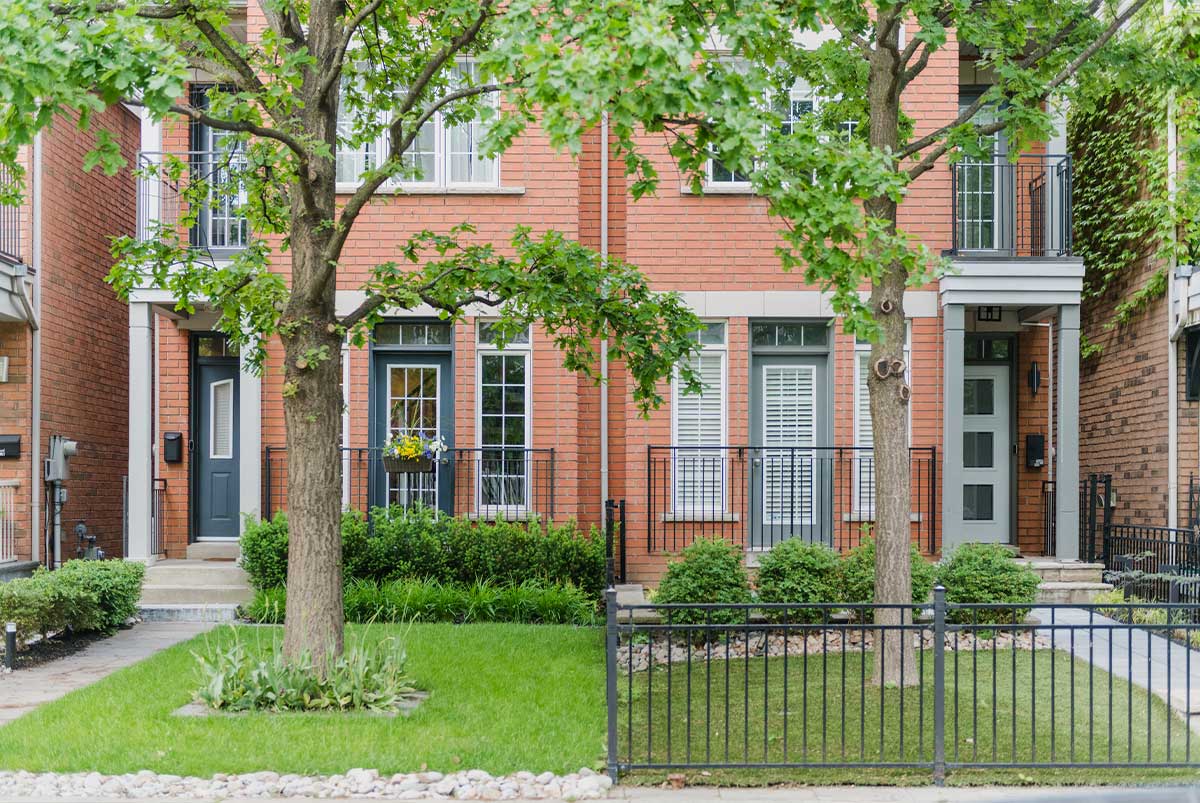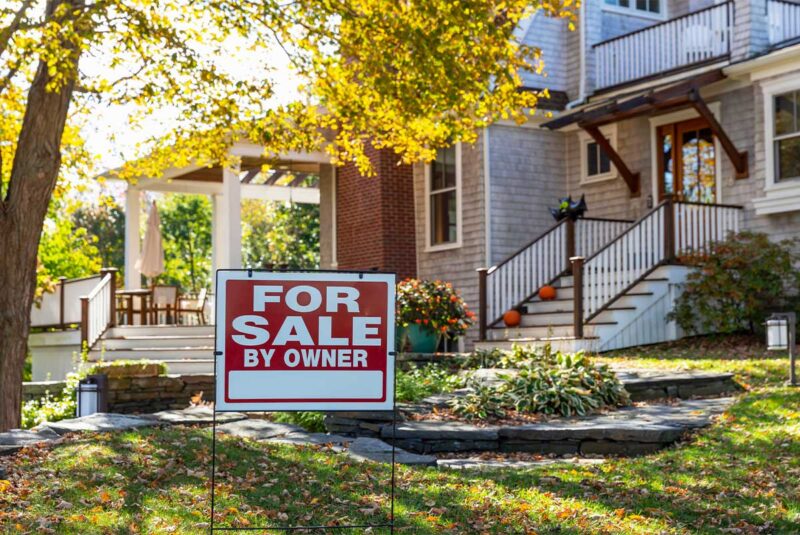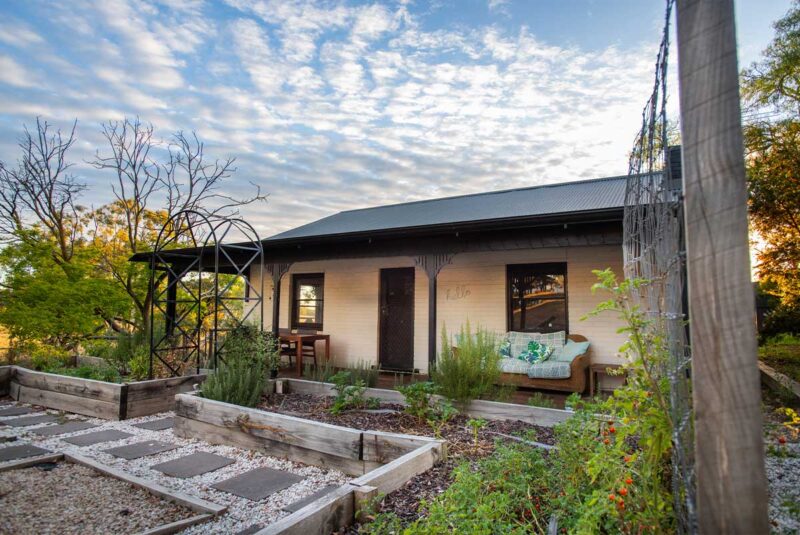Ready To Buy a Home?
Get Approved to Buy a Home
Rocket Mortgage® lets you get to house hunting sooner.
Let’s say you’re shopping for your new home. You know you want something in a complex with shared spaces. As you search, you keep running into two names for properties that seem almost identical: condos and townhouses. But what’s the difference between a condo and a townhouse? How do you know which is right for you?
In this article, we’ll break down the differences between condo and townhouse units by looking at the physical space and ownership types of each. By the end, you’ll have the information you need to help you decide if a condo or townhouse makes more sense for you.
What Is a Condo?
A condominium – or condo – is usually a single-unit dwelling that’s part of a larger complex. The unit is owned by an individual, but ownership only extends to the walls of the apartment. Shared spaces, like hallways between units, aren’t the responsibility of a single unit’s owner.
Instead, a condo association handles the management and ownership of shared spaces. Individual condo owners usually pay fees to the condo association for the upkeep of common areas, like landscaping. Unit owners might also get to vote on projects related to the entire complex.
PROS of Buying a Condo👍
Condos are often more affordable than townhouse units because you’re only buying the interior of the apartment.
Unlike a single-family home, condo owners share some ownership responsibilities with other unit owners in their complex. For example, if the condo needs new tiles in the hallways, the condo owners generally pay for these costs as a community via their condo association fees.
Many condo complexes are in desirable locations, such as vacation destinations or high-rises in urban areas of major cities.
CONS of Buying a Condo👎
By only owning the interior of your condo, your neighbors might have a bigger say in how you use your home or the looks of the condo building.
Sharing the cost of ownership means paying dues, which go into a pool of money with other owners’ dues, to pay for maintenance, amenities and other common ownership costs. You may find condo fees are higher than the homeowner association (HOA) fees of a townhome community.
Like many real estate investments, condo units generally gain value over time. However, condos often gain value slower than comparable townhomes.
What Is a Townhouse?
Townhouses, sometimes called townhomes, are usually multi-floor, single-family homes that share walls with neighbors. Often, townhomes are either attached to other units via exterior walls or semi-detached but aren’t usually their own structure.
Like condos, townhouse communities may share some amenities or common spaces with neighbors. However, townhouse owners own the property their unit sits on. They’re also usually responsible for the exterior of their dwelling.
Modern townhouses are sometimes part of a planned unit development (PUD). A PUD is a type of planned community that includes residential and commercial amenities. Some PUDs look like small towns and include townhouses, schools, playgrounds and shops.
PROS of Buying a Townhouse👍
Most townhomes feature multiple stories, and they often have more square footage than a condo.
Some townhouse developments act as micro-cities, giving owners a community-based experience. This could include shared amenities, like a swimming pool or fitness center.
A townhouse could give you a greater sense of homeownership than a condo because you’ll own the exterior of the unit and the property it sits on.
CONS of Buying a Townhouse👎
A townhouse is like a single-family home connected to another single-family home. Owners are responsible for home maintenance costs for their individual units, unlike the shared responsibility of condo owners.
While townhouse owners have more control over their property, townhome communities usually have a homeowners association. Townhouse owners have to follow the restrictions and guidelines of the HOA.
Although some townhouses have access to community amenities, many are in more remote locations than condo complexes. There may not be as many amenities within walking distance of your townhouse compared to a condo.
Condo vs. Townhouse: What Are the Related Costs?
Whether you buy a detached single-family home, condo or townhouse, you’ll face some costs of ownership. Maintenance and insurance expenses could play a role in whether you buy a townhouse or a condo.
Let’s dig into the common costs associated with a condo versus a townhouse.
Maintenance
The overall maintenance costs for a condo may be lower compared to maintenance costs for a similar townhouse. That’s because much of the maintenance of the condo building is shared by the individual unit owners.
For example, if a pipe bursts in a condo community, the owners of all of the affected units may have to cover the cost of repairs. This could lower the overall cost because you’re sharing the expense with others.
In a townhome, you’re responsible for the upkeep of your home. If a pipe bursts in your home, you’ll likely have to cover the cost of a plumber on your own.
Homeowners association (HOA) fees
A homeowners association, or HOA, is a critical part of condo or townhome living. Homeowners associations take care of the maintenance of common areas and help manage the community as a whole.
In addition, HOAs often set rules and restrictions on the use of your property. This might include the color you can paint your townhome or whether you can rent out your condo.
If you buy a condo or townhouse, you can expect to pay monthly HOA fees. The exact amount you’ll pay depends on the location of the community as well as the amenities and services offered.
However, condo association fees are often higher than townhome HOA fees. Condo associations tend to have more expenses related to the financial management of the complex, like insurance for the condo building structure.
Homeowners insurance
On the other hand, your homeowners insurance costs for a condo might be lower than insurance for a townhouse. Generally, condo owners only have to cover the interior of their unit. The insurance company can charge less because they don’t have to repair or rebuild the structure of the condo building.
A townhouse insurance policy typically has higher costs because townhome owners are responsible for insuring their entire structure and property.
Condo vs. Townhouse: Costs of Buying and Selling
Anytime you buy real estate, you have to think of the overall costs of buying the property in addition to the sale price. When looking at the differences between condo and townhouse properties, the smaller expenses can add up. Be sure to consider all of the costs of buying and selling when comparing condos and townhomes.
You’ll also want to think about the difference between buying an attached dwelling and a detached home. Condos and townhouses could have different lending requirements over a traditional, single-family home.
Finally, your costs of buying and selling a condo versus a townhouse also depend on what you want to do with the unit. You might plan to sell the unit in the future. Some homebuyers turn their condo or townhome into a vacation home or investment property when they move on. These choices can change how much it costs to buy, maintain or sell your unit.
Purchase price
At first glance, condos tend to look more affordable than townhouses. Purchase prices for condos are often lower compared to townhouses in the same area.
The reason? Condos are usually smaller than townhouses. Less square footage often means a lower list price.
However, condo home buyers might find that the cost evens out because mortgage lenders may charge higher interest rates for a condo loan. Many mortgage lenders consider condos a higher-risk property than a townhome or single-family detached home.
Mortgage approval
You may face a longer approval process for a condo loan over a mortgage for other types of homes.
Mortgage lenders have to look at both the creditworthiness of you – the condo buyer – and the condo community as a whole. A condo mortgage application may require financial statements from the condo association to assess the financial health of the condo community.
The lender may also want to know the percentage breakdown of use for the units in the complex. They could ask how many units are investment properties, primary residences or second homes.
Resale value
Even if you plan to live in the unit forever, it’s usually a good idea to consider its future value.
You might want – or need – to sell the condo or townhome in the future. Compared to detached single-family homes, condos and townhouses tend to have lower appreciation rates. You may have to hold onto the property longer to make a profit on the sale.
Conversion to investment properties
You may have plans to convert your unit into an investment property and rent it out when you move. In that case, it’s a good idea to consider the location, amenities and type of property before buying. Some questions to ask yourself include:
- What type of renter are you looking for – long-term renters who will live there for years or short-term, vacation renters?
- Does the community have amenities your ideal renter wants or needs?
- Is the property in a location that’s desirable for renters?
The HOA could also affect your ability to turn the unit into an investment property. Some HOAs place restrictions on renting out your unit. For instance, communities in high-traffic vacation areas may restrict short-term rentals on units. So you won’t be able to use the property for vacation rentals, like Airbnb or VRBO.
Condo vs. Townhouse: Which Is Right for You?
There are a lot of things to consider when deciding between buying a condo or a townhouse. For example, you have to think about your personal needs, future plans and the financial costs of each type of property.
Being aware of the unique aspects of both types of properties should help you find the one that’s right for you. Remember that buying a home is a personal process, and what’s best for someone else may not be best for you.
Take the first step toward buying a home.
Get approved. See what you qualify for. Start house hunting.
The Short Version
- A condominium is usually an apartment unit that’s owned by an individual and part of a larger condominium complex
- Townhouses tend to be multi-floor units and often have more space than condos
- Generally, both condos and townhomes require homeowners association (HOA) dues for the maintenance of shared spaces




